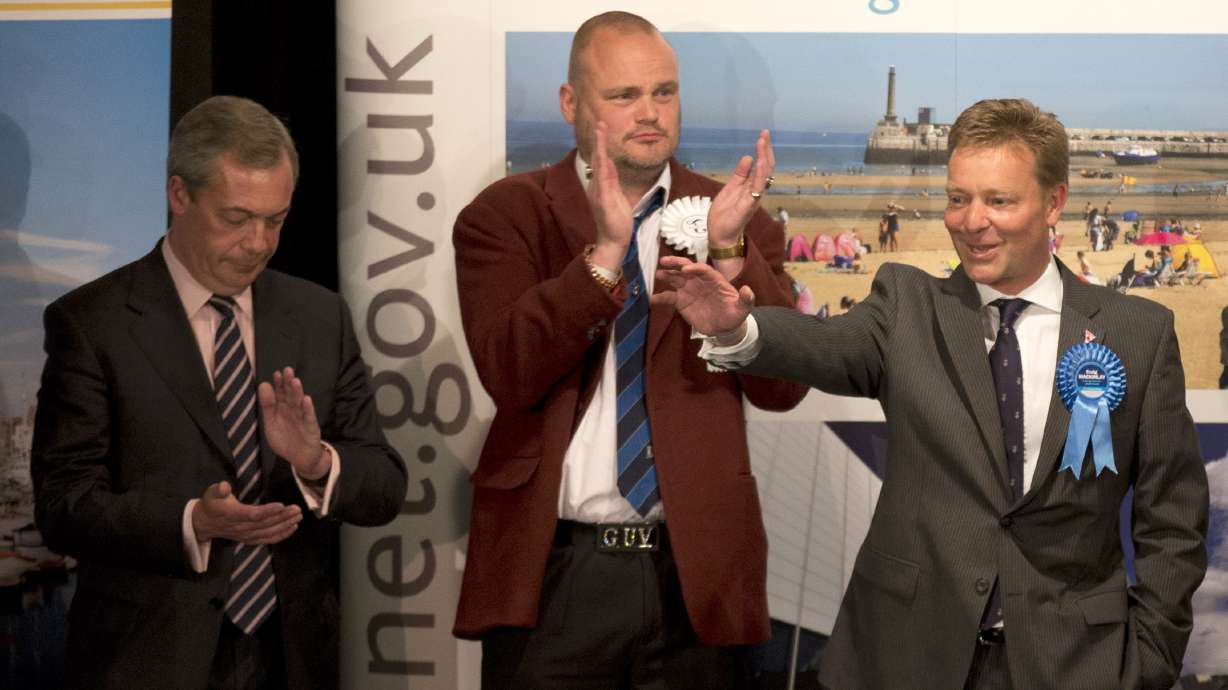Estimated read time: 3-4 minutes
This archived news story is available only for your personal, non-commercial use. Information in the story may be outdated or superseded by additional information. Reading or replaying the story in its archived form does not constitute a republication of the story.
BRUSSELS (AP) — It might seem logical that triumph for David Cameron's traditionally Euro-skeptic Tories would boost the likelihood of Britain splitting from the European Union in a referendum the prime minister has promised to call by 2017.
But things are rarely so simple in European politics.
Victory has given Cameron his best chance yet to push through enough reform within the EU to avoid "Brexit." And the poor showing of the UK Independence Party — whose iconic leader Nigel Farage resigned after failing to win his seat — greatly frees up the British leader to seek a compromise with his EU counterparts.
Cameron's Conservatives also represent big business, which is terrified at the prospect of losing billions in trade that comes from EU membership. The prime minister himself is more of a pro-business pragmatist than a true Euro-skeptic, and that lack of ideological investment may lead him to argue that Britain's economic interests lie within the EU.
The election result "will give him a momentum to negotiate hard, get a deal which he feels confident enough that he can put to the British people and ask them to vote 'yes', ask them to vote 'yes' to Britain's future in the European Union," said Professor Maurice Fraser of the London School of Economics European Institute.
For their part, European leaders may now start thinking twice about their hard-line stance against granting Britain concessions. The EU leadership knows that losing a big player like Britain would deal a massive economic and psychological blow to the European project. Sensing that Cameron may now have reason to preach the virtues of EU membership to his people, EU leaders such as Germany's Angela Merkel may want to nudge things along by handing out goodies.
The European mood appeared to shift just hours after the extent of Cameron's victory became clear — with the EU's two top officials coming out with conciliatory messages.
"I stand ready to work with you to strike a fair deal for the United Kingdom in the EU," EU Commission President Jean-Claude Juncker said in a congratulatory message.
EU President Donald Tusk was hardly less glowing.
"I count on the new British government making the case for the United Kingdom's continued membership of the European Union," Tusk said. "In that I stand ready to help."
He lauded Britain's "common sense agenda, keeping the emphasis on a competitive economy ... non-intrusive regulation, openness to trade with other nations, and a confident foreign policy. Objectives which I share."
Cameron will also feel the hot breath of British business in his neck to keep Britain in the EU. It needs Europe for exports, and if the U.K. leaves, British corporations will be pushed to the sidelines, facing much bigger financial costs to maintain a foothold in the world's wealthiest market.
Britain already enjoys more autonomy than other EU countries. It has stayed outside the euro common currency used by 19 EU nations, and kept its borders controls out of the joint Schengen zone used by almost all other member states. Still, the imposition of EU-wide rules on travel that has allowed many east Europeans to settle and work in Britain has enraged many British voters.
Cameron's task may now include persuading these voters that welcoming workers from across the EU has helped to invigorate the British economy — instead of taken away jobs.
Another challenge Cameron faces is his delicate diplomatic dance with European leaders — and his past shows a tendency to step on toes. He will have to be discreet enough to couch his demands for more independent decision-making in terms that won't rile the likes of Merkel and French President Francois Hollande, who face elections in the same year Britain is set to hold its referendum.
But Cameron must also create the impression at home that he's imposing a British vision on the EU.
"The U.K. government is likely to want to have some reforms to argue they are staying within the 'reformed EU' rather than the 'old EU'," said Fabian Zuleeg of the European Policy Center think tank.
___
Follow Raf Casert at http://twitter.com/rcasert
Copyright © The Associated Press. All rights reserved. This material may not be published, broadcast, rewritten or redistributed.








